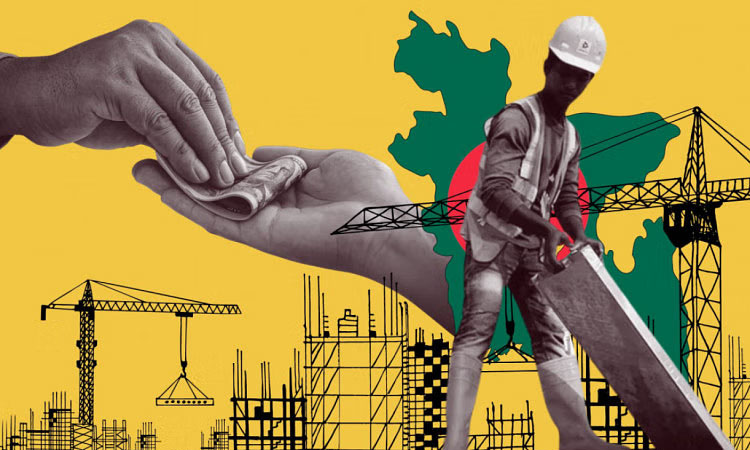News Flash
News Flash

By A K M Kamal Uddin Chowdhury
DHAKA, Sept 26, 2025 (BSS) - After the fall of the Awami League regime on August 5, 2024, Bangladesh has been witnessing an unprecedented surge in remittance inflow, a critical factor reshaping the financial landscape and driving the economic recovery.
According to the Bangladesh Bank (BB) data, the inflow of remittance hit a record-breaking figure in the fiscal year 2024-25 (FY25), receiving over US$30 billion, a significant jump from the previous record of $24.77 billion set in FY 2020-21.
The momentum is also continuing in FY 2025-26, with the first two months, July to August, registering $4.9 billion remittance which is 18.4 percent higher than the same period of the previous fiscal FY25.
This influx offers a vital "glimmer of hope" for Bangladesh's economic resilience amid ongoing global uncertainties.
With more than 12 million Bangladeshis living abroad, the potential for continued growth in these inflows remains significant.
Economists and experts observed that the remarkable remittance boom has emerged as a crucial driver in stabilizing Bangladesh's economy. These funds have not only bolstered foreign exchange reserves but have also played a role in stabilizing the exchange rate of the Bangladeshi taka, thereby alleviating pressure on the national currency.
Furthermore, remittances are supporting the country's balance of payments, ensuring a strong and sustainable inflow of foreign currency amidst persistent challenges like inflation, economic slowdowns, and rising debt levels.
To encourage the use of legal pathways and maximize the benefit to the nation, Bangladesh Bank Executive Director and Spokesperson Arif Hussain Khan said the government is giving a 2.5 percent cash incentive for remittances sent through formal channels.
Remitters now feel encouraged to send their money through formal banking channels instead of the illegal "hundi" system, which can help boost the country's foreign exchange reserves, he added.
Riding on the growing inflow of remittances, Bangladesh's gross foreign exchange reserves rose to $31.28 billion by September 24, 2025, as per the traditional calculation of the central bank.
Apart from neutralising hundi, bankers said the prevailing stable exchange rate played a key role in alluring remitters to choose formal options to send their money back home as the rate differential between banks and the kerb market is too small.
According to market players, remitters are getting a maximum exchange rate of Taka 121.75 a dollar from the banking system, while it is Taka 122.50 a dollar in the kerb market.
Deputy Managing Director (DMD) of the Dutch-Bangla Bank Limited Mohammed Shahid Ullah said the demands for hundi and hawala -- illegal cross-border money transfer channels -- have declined following a crackdown on operators after the political changeover.
"This has diverted more remittances through formal banking channels," he added.
He also mentioned that the forex market has stabilised in recent months due to higher dollar inflows driven by increased remittances.
He, however, said that the positive effects of the remittance boom are highly visible across Bangladesh, particularly in rural communities where many families depend on money sent from relatives working internationally.
While a large portion of these funds covers daily expenses, an increasing amount is being channeled into crucial long-term investments, including small businesses, education, and healthcare, providing opportunities for upward mobility, he added.
For instance, in the south-eastern villages of Feni, he stated that remittance funds have facilitated the opening of several small businesses.
"Local shop owners have used the money to purchase inventory, while others have invested in skill development, subsequently offering new services and creating local employment opportunities that lift community living standards."
Saying that Bangladesh's record remittances not merely as a temporary economic windfall, he explained it is an essential lifeline supporting both immediate recovery and long-term development.
However, he noted that the country must maintain focus on spreading the benefits of remittances equitably, improving infrastructure, and promoting education.
According to a study of the World Bank, remittances have been significant in reducing poverty, helping to lift millions of Bangladeshis out of poverty. The impact is noticeable in human development indices, as families receiving funds are better able to afford private schooling and essential medical treatment.
In urban centers like Dhaka, the capital, increased consumer spending driven by remittances is fueling the retail sector. Small markets and stores are reporting a rise in sales across food, clothing, and other consumer goods, leading to the creation of new job opportunities and boosting the local economy. Businesses in Dhaka specifically have reported an uptick in demand for both luxury and essential items.
Recognizing the vital role remittances play in the recovery, the Bangladesh government is strategically investing a significant portion of these inflows into large-scale infrastructure projects. These initiatives, which include the development of modern bridges, highways, and urban transit systems, are designed to enhance connectivity across the country.